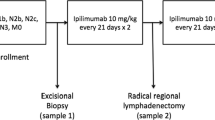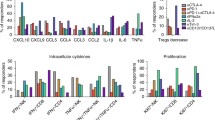Abstract
Background
Ipilimumab can induce durable disease control and long-term survival in patients with metastatic melanoma. Identification of a biomarker that correlates with clinical benefit and potentially provides an early marker of response is an active area of research.
Patients and methods
Ipilimumab was available upon physician request for patients aged ≥16 years with stage III (unresectable) or IV cutaneous, ocular or mucosal melanoma, who had failed or did not tolerate previous treatments and had no other therapeutic option available. Patients received ipilimumab 3 mg/kg every 3 weeks for four doses. Tumour assessments were conducted at baseline, Week 12 and Week 24 using immune-related response criteria. Patients were monitored continuously for adverse events (AEs), including immune-related AEs. Candidate immunological markers were evaluated in peripheral blood and sera samples collected at baseline and Weeks 4, 7, 10 and 12.
Results
Among 95 patients treated with ipilimumab 3 mg/kg, the immune-related disease control rate at Week 24 was 38 %. With a median follow-up of 24 months, median overall survival was 9.6 months. Both disease control and survival were significantly associated with decreasing levels of lactate dehydrogenase, C-reactive protein and FoxP3/regulatory T cells, and increasing absolute lymphocyte count, between baseline and the end of dosing (Week 12).
Conclusion
Ipilimumab is a feasible treatment option for heavily pretreated patients with metastatic melanoma. Changes in some immunological markers between baseline and the fourth ipilimumab infusion appear to be associated with disease control and survival, but verification in prospective clinical trials is required.


Similar content being viewed by others
Abbreviations
- AE:
-
Adverse event
- ALC:
-
Absolute lymphocyte count
- BORR:
-
Best overall response rate
- CI:
-
Confidence interval
- CR:
-
Complete response
- CRP:
-
C-reactive protein
- CTLA-4:
-
Cytotoxic T-lymphocyte-associated antigen-4
- DCR:
-
Disease control rate
- EAP:
-
Expanded access programme
- ECOG:
-
Eastern Cooperative Oncology Group
- FACS:
-
Fluorescence-activated cell sorting
- ir:
-
Immune-related
- irRC:
-
Immune-related response criteria
- LDH:
-
Lactate dehydrogenase
- OS:
-
Overall survival
- PD:
-
Progressive disease
- PBMC:
-
Peripheral blood mononuclear cell
- PR:
-
Partial response
- PS:
-
Performance status
- SD:
-
Stable disease
- Tregs:
-
Regulatory T cells
- ULN:
-
Upper limit of normal
- WBC:
-
White blood cell
References
Hodi FS, O’Day SJ, McDermott DF, Weber RW, Sosman JA, Haanen JB et al (2010) Improved survival with ipilimumab in patients with metastatic melanoma. N Engl J Med 363:711–723
Prieto PA, Yang JC, Sherry RM, Hughes MS, Kammula US, White DE et al (2012) CTLA-4 blockade with ipilimumab: long-term follow-up of 177 patients with metastatic melanoma. Clin Cancer Res 18:2039–2047
Chapman PB, Hauschild A, Robert C, Haanen JB, Ascierto P, Larkin J et al (2011) Improved survival with vemurafenib in melanoma with BRAF V600E mutation. N Engl J Med 364:2507–2516
Hauschild A, Grob JJ, Demidov LV, Jouary T, Gutzmer R, Millward M et al (2012) Dabrafenib in BRAF-mutated metastatic melanoma: a multicentre, open-label, phase 3 randomised controlled trial. Lancet 380:358–365
Ascierto PA, Schadendorf D, Berking C, Agarwala SS, van Herpen CM, Queirolo P et al (2013) MEK162 for patients with advanced melanoma harbouring NRAS or Val600 BRAF mutations: a non-randomised, open-label phase 2 study. Lancet Oncol 14:249–256
Kim KB, Kefford R, Pavlick AC, Infante JR, Ribas A, Sosman JA et al (2013) Phase II study of the MEK1/MEK2 inhibitor Trametinib in patients with metastatic BRAF-mutant cutaneous melanoma previously treated with or without a BRAF inhibitor. J Clin Oncol 31:482–489
Atkinson AJ, Magnuson WG, Colbern WA, DeGrutolla VG, DeMets DL, Downing GJ et al (2001) Biomarkers and surrogate endpoints: preferred definitions and conceptual framework. Clin Pharmacol Ther 69:89–95
Oldenhuis CN, Oosting SF, Gietema JA, de Vries EG (2008) Prognostic versus predictive value of biomarkers in oncology. Eur J Cancer 44:946–953
Fox BA, Schendel DJ, Butterfield LH, Aamdal S, Allison JP, Ascierto PA et al (2011) Defining the critical hurdles in cancer immunotherapy. J Transl Med 9:214
Menard C, Ghiringhelli F, Roux S, Chaput N, Mateus C, Grohmann U et al (2008) CTLA-4 blockade confers lymphocyte resistance to regulatory T-cells in advanced melanoma: surrogate marker of efficacy of tremelimumab? Clin Cancer Res 14:5242–5249
Sarnaik AA, Yu B, Yu D, Morelli D, Hall M, Bogle D et al (2011) Extended dose ipilimumab with a peptide vaccine: immune correlates associated with clinical benefit in patients with resected high-risk stage IIIc/IV melanoma. Clin Cancer Res 17:896–906
Marshall MA, Ribas A, Huang B (2010) Evaluation of baseline serum C-reactive protein (CRP) and benefit from tremelimumab compared to chemotherapy in first-line melanoma. J Clin Oncol 28: abstr 2609
Ku GY, Yuan J, Page DB, Schroeder SE, Panageas KS, Carvajal RD et al (2010) Single-institution experience with ipilimumab in advanced melanoma patients in the compassionate use setting: lymphocyte count after 2 doses correlates with survival. Cancer 116:1767–1775
Simeone E, Gentilcore G, Romano A, Daponte A, Caraco C, Grimaldi AM, et al (2012) Immunological and Biological Changes During Ipilimumab Treatment and their Correlation with Clinical Response and Survival. J Clin Oncol 30 (suppl). abst 8573
Wolchok JD, Hoos A, O’Day S, Weber JS, Hamid O, Lebbé C et al (2009) Guidelines for the evaluation of immune therapy activity in solid tumors: immune-related response criteria. Clin Cancer Res 15:7412–7420
Ascierto PA, Napolitano M, Celentano E, Simeone E, Gentilcore G, Daponte A et al (2010) Regulatory T cell frequency in patients with melanoma with different disease stage and course, and modulating effects of high-dose interferon-alpha 2b treatment. J Transl Med 8:76
Korn EL, Liu PY, Lee SJ, Chapman JA, Niedzwiecki D, Suman VJ et al (2008) Meta-analysis of phase II cooperative group trials in metastatic stage IV melanoma to determine progression-free and overall survival benchmarks for future phase II trials. J Clin Oncol 26:527–534
Ascierto PA, Kalos M, Schaer DA, Callahan MK, Wolchok JD (2013) Biomarkers for immunostimulatory monoclonal antibodies in combination strategies for melanoma and other tumor types. Clin Cancer Res 19:1009–1020
Breunis WB, Tarazona-Santos E, Chen R, Kiley M, Rosenberg SA, Chanock SJ (2008) Influence of cytotoxic T lymphocyte-associated antigen 4 (CTLA4) common polymorphisms on outcome in treatment of melanoma patients with CTLA-4 blockade. J Immunother 31:586–590
Hamid O, Schmidt H, Nissan A, Ridolfi L, Aamdal S, Hansson J et al (2011) A prospective phase II trial exploring the association between tumor microenvironment biomarkers and clinical activity of ipilimumab in advanced melanoma. J Transl Med 9:204
Wang W, Yu D, Sarnaik AA, Yu B, Hall M, Morelli D et al (2012) Biomarkers on melanoma patient T cells associated with ipilimumab treatment. J Transl Med 10:146
Yuan J, Adamow M, Ginsberg BA, Rasalan TS, Ritter E, Gallardo HF et al (2011) Integrated NY-ESO-1 antibody and CD8 + T-cell responses correlate with clinical benefit in advanced melanoma patients treated with ipilimumab. Proc Natl Acad Sci USA 108:16723–16728
Delyon J, Mateus C, Lefeuvre D, Lanoy E, Zitvogel L, Chaput N et al (2013) Experience in daily practice with ipilimumab for the treatment of patients with metastatic melanoma: an early increase in lymphocyte and eosinophil counts is associated with improved survival. Ann Oncol 24:1697–1703
Di Giacomo AM, Calabro L, Danielli R, Fonsatti E, Bertocci E, Pesce I et al (2013) Long-term survival and immunological parameters in metastatic melanoma patients who responded to ipilimumab 10 mg/kg within an expanded access programme. Cancer Immunol Immunother 62:1021–1028
Wilgenhof S, Du FS, Vandenbroucke F, Everaert H, Salmon I, Liénard D et al (2013) Single-center experience with ipilimumab in an expanded access program for patients with pretreated advanced melanoma. J Immunother 36:215–222
Postow MA, Chasalow SD, Yuan J, Kuk D, Panageas KS, Cheng M et al (2013) Pharmacodynamic effect of ipilimumab on absolute lymphocyte count (ALC) and association with overall survival in patients with advanced melanoma. J Clin Oncol 31: abstr 9052
Balch CM, Gershenwald JE, Soong SJ, Thompson JF, Atkins MB, Byrd DR et al (2009) Final version of 2009 AJCC melanoma staging and classification. J Clin Oncol 27:6199–6206
Tartour E, Blay JY, Dorval T, Escudier B, Mosseri V, Douillard JY et al (1996) Predictors of clinical response to interleukin-2–based immunotherapy in melanoma patients: a French multiinstitutional study. J Clin Oncol 14:1697–1703
Blank CU, Kelderman S, van Tinteren H, Heemskerk B, van den Brom R, Hospers GA et al (2013) Serum lactate dehydrogenase (LDH) as a prognostic selection criterion for ipilimumab treatment in metastatic melanoma. J Clin Oncol 31: abstr 3036
Hotson D, Conroy A, Evensen E, Gentilcore G, Simeone E, Esposito A et al (2012) CTLA-4 defines distinct T cell signaling populations in healthy donors and metastatic melanoma patients. J Immunother 11: abstr 760
Ladoire S, Martin F, Ghiringhelli F (2011) Prognostic role of FOXP3 + regulatory T cells infiltrating human carcinomas: the paradox of colorectal cancer. Cancer Immunol Immunother 60:909–918
Acknowledgments
This work was supported in part by the Italian Ministry of Health, via the Ricerca Corrente 2010. The authors would like to thank the patients and investigators who participated in the European EAP. The EAP was sponsored by Bristol-Myers Squibb. Editorial and writing assistance was provided by StemScientific, funded by Bristol-Myers Squibb (BMS).
Author information
Authors and Affiliations
Corresponding author
Rights and permissions
About this article
Cite this article
Simeone, E., Gentilcore, G., Giannarelli, D. et al. Immunological and biological changes during ipilimumab treatment and their potential correlation with clinical response and survival in patients with advanced melanoma. Cancer Immunol Immunother 63, 675–683 (2014). https://doi.org/10.1007/s00262-014-1545-8
Received:
Accepted:
Published:
Issue Date:
DOI: https://doi.org/10.1007/s00262-014-1545-8




